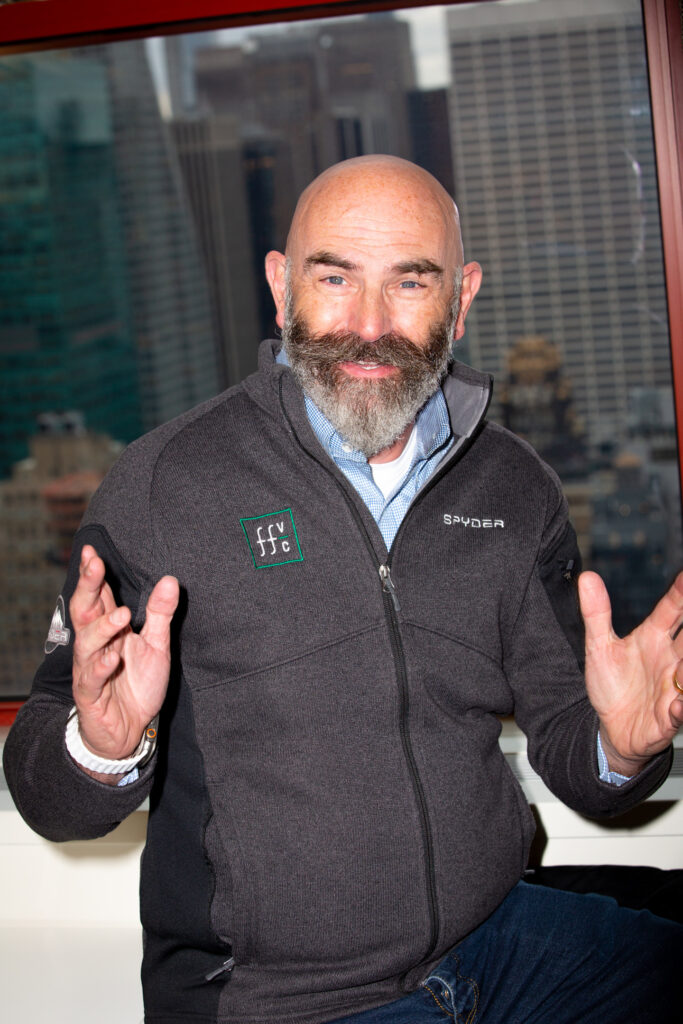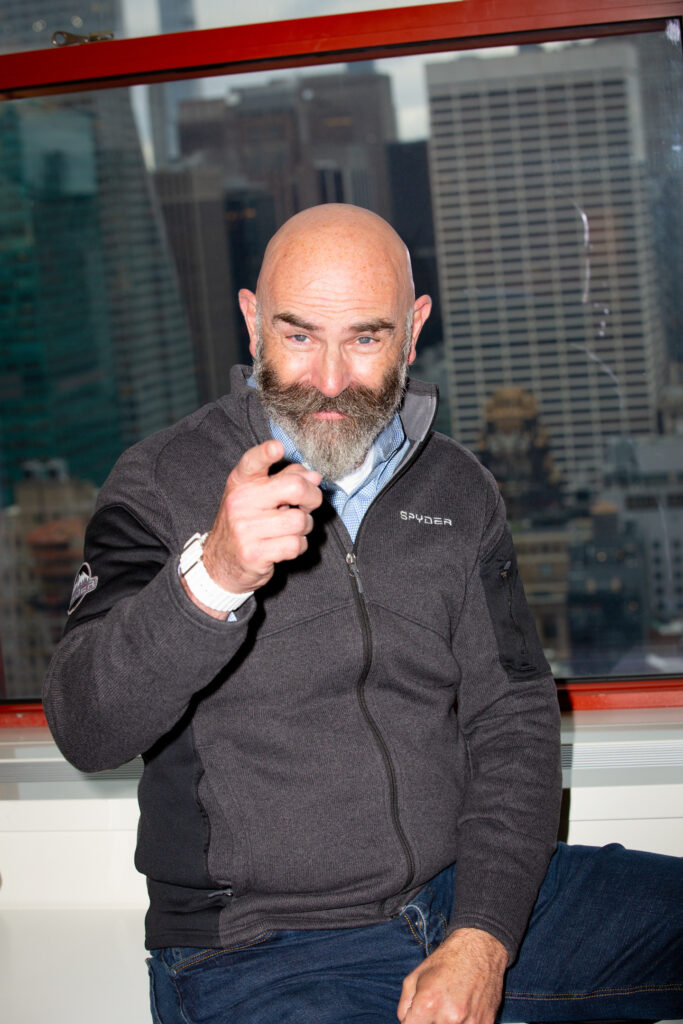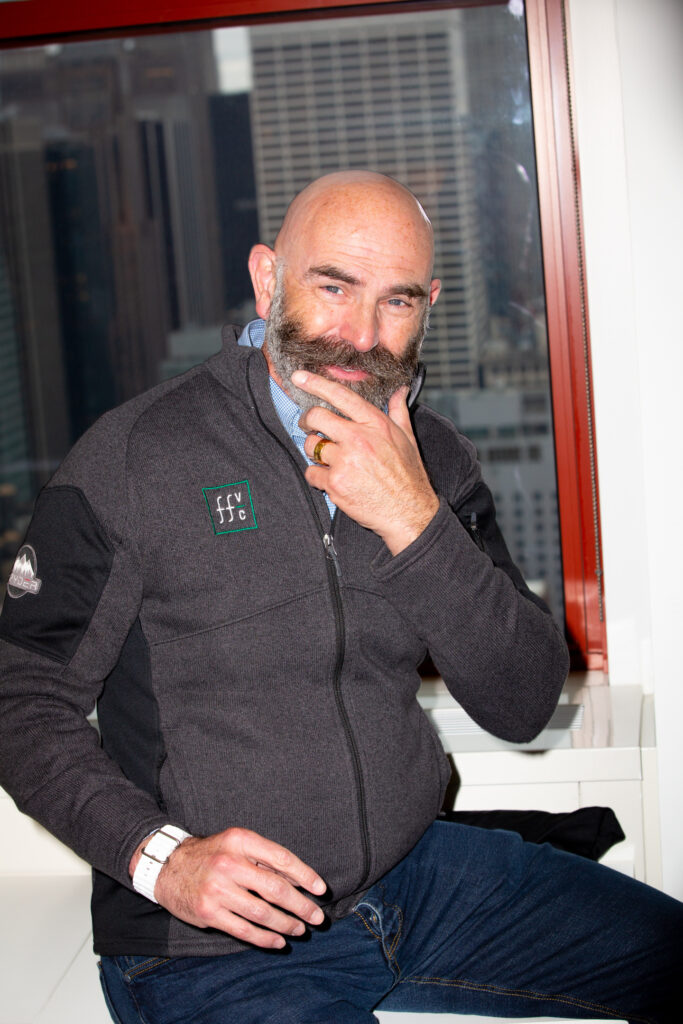The deeply thoughtful, open, and energetic John Frankel has been blessed his entire life with a drive to learn and to explore. This energized curiosity has powered him through a career at the highest levels of finance, and now to starting and running the firm ff Venture Capital which specializes in investing in the future, be it in AI, last mile drone delivery systems or a range of businesses that 5 years ago would have seemed highly improbable to most people.
His current passion is learning how to maintain his body with a 25-year horizon. Many times in our conversation John would say, “Tell me more; I want to learn as much as I can.” At no point did this clearly learned and accomplished man ever try to impress me with his knowledge — beginner’s mind being so natural to him (which may be his secret superpower).

John, how old are you?
I am 62.
What are you most proud of?
My family. I tell my kids: “Whatever you want to do in life, I have a very high bar for you. I want you to live a life that’s healthy, a life where you’re a good person, and one where you’re happy.” And they’ve really followed that. And what more can you ask as a parent?
“I’ve had this philosophy of: How do you be respectful for your future self?”
What’s your ambition for the next five years?
I just developed this view in my 20s: I want to be respectful to my 65-year-old self. So, don’t abuse alcohol, drugs, debt, or exercise. Kids who over-exercise in their 20s, the knees are gone, their meniscus is torn, they can’t run, they can’t do this.
I’ve had this philosophy of: How do you be respectful for your future self? I’m in my 60s; my question is: How do I be respectful to my 85-year-old self? One of the things I want to be able to do is get out of a chair unaided. I’ve revamped my diet to be high protein, and I go to the gym three, four times a week. Long sessions, intense sessions, like an hour and a half, two hours of pushing and pulling a lot of weight.
So, let me share this stat with you. It’s different for women because they tend to have a smaller muscular base but, for men, they lose about 3% each year of their muscle mass, their lean body mass, between the age of 50 and 60. Between the age of 60 and 70, they lose about 5%. I know it’s compounding, but just think of a simple average level for the average person: their 70-year-old self has half the muscle they had when they were 60. You have less muscle, there’s less strain on your bones, your bones are weaker.

“My objective is to have more muscle when I’m 70 than when I was 60”
My objective is to have more muscle when I’m 70 than when I was 60. And I’m only about six months into this, but I am shocked that by changing my diet to be higher in protein and eating a lot more than I used to be, and working out like this, that you can actually recomp your body. The more I read about longevity, the more I think it’s important. Six to eight hours a week; it’s not a lot, but I think it’s well sub-1% of people who do it. When I go to the gym, there’s no one there who’s there as long as I am in the gym I go to, and I’m just moving weights. Two months ago, I didn’t think I’d ever be moving the weights I’m moving now.
At the moment, I’m learning all about this. I never did weightlifting as a kid, so it’s all new to me. Creatine is a supplement, never thought about it, never knew about it. Incredibly safe and really effective and probably neuroprotective as well. I don’t know why everyone isn’t on creatine. I’m learning from talking to professionals, from Dr. YouTube, from reading books —it just fascinates me. So, that’s my current intense area of focus and education at the moment. I love that you go through life and not know anything six months or a year ago about something, and then really be able to learn stuff. I think continuous learning is fun; and just find areas of things that intrigue you.

The 25-year-plan is wanting to be able to get out of a chair unaided. I will tell you this, that even at my age, the things I’m doing now just make me much more agile and mobile than I was. Like, getting out of a low chair was more of an effort. Now you just stand up, and that’s what it used to be like when I was a kid. So, it’s use it or lose it.
What are the reasons more people don’t do this?
Anybody can do it. But my estimate is, of my age, it’s sub-1%. It may only be like a 10th of 1% of people doing it. And part of it is not knowing, and part of it is just the discipline. If your muscle is turning over every four months, you just can’t stop doing it. You’re just waking the body up, which otherwise is slowly going to sleep. And then there’s the brain and the neuroplasticity.
“We must keep learning”
You seem so engaged.
We must keep learning. I also think there’s a zen to anything. And when you get in the zen of doing something, I think it’s very healthy for your mind.
Let’s talk a little bit about things. What’s your view on AI? There seem to be two poles on this.
Okay, so I’ll address the two poles. I’ll give my views. I’ve used the term S-curve before; it’s a technical term, but what it means is things usually start slowly, then they accelerate up, and the curve becomes steeper and then the steepness slows down and they flatten out, asymptotic to some flat level, approaching but never quite getting there. The people who are scared of AI think we’re at the sharp upward slope of the S-curve. The complacent people think we’re at the top of the S-curve, and it’s slowing down.
When you use OCR technology, Optical Character Recognition, one of the first deployments of AI, okay, there’s print on the page, you can read it and digitalize what that print is and turn it into a Word document or whatever. We’re not really scared of that. So, there’re lots of levels of AI.
I think where people start to get scared is this philosophical concept called the singularity. The singularity posits that you end up with an AI that not only becomes as bright as a human across all fields, but can write its own code, it can make itself even smarter and continue to do that and exponentially become way more intelligent than humans. And then if you give that control access to nuclear weapons or whatever, we feel threatened. So, I think there’s that dynamic.
Then there’s the other dynamic, and this is where I’m more chill with it, is job replacement. Because, how do I put this? The notion of technology is to provide tools to mankind so that mankind can do less and less and focus on more and more higher-order things. Now, if you’re Socrates, those higher-order things are thinking about the human condition. Like, if you’re a hedonist, it’s going and partying and playing video games. But whatever it is, you’ll have more free time to do stuff. And I’m a believer that’s a good thing. I’m not upset that there isn’t a whole buggy whip manufacturing industry. I’m not upset that there isn’t a medical journal print publication industry. Now all those jobs were eliminated. And it is very easy to see the jobs that technology destroys. It is very difficult to see the jobs that technology creates. But we have high employment today than we had earlier times, but it’s very disruptive.
“It is very easy to see the jobs that technology destroys. It is very difficult to see the jobs that technology creates”
And during disruption, you have to learn to do new things. During the Industrial Revolution, a lot of isms were created. Capitalism, communism, socialism, nihilism, a lot of these things because of disruption in society. But I would argue we have a higher standard of living, we live longer, we have more access to entertainment and goodies than people had during the Industrial Revolution. And it’s been a net benefit. And I don’t see that not continuing, but it will be disruptive. There will be people whose jobs will be displaced, but new jobs will be created and ultimately more value will be created for people. The one piece of technology which has not been invented yet, but in the next 30, 40 years could be, is effectively, if you think about Star Trek, is a replicator.
So, an atom-level 3D printer. If that product could exist on a generalized basis, that would eliminate the need for money and would completely upend society. Outside of that, I think having these smarter tools is really helpful and we’ll just have them in different places.
I see your world also very much intersects with popular culture. How do you keep in touch with popular culture?
I try to read widely and be on X, Twitter, but, in reality, it’s a team approach. We have people of all different ages, people with very diverse backgrounds. We try to have a culture of listening and try to give everybody agency to advocate for things they think are important. I’m a great believer in passion and when we have someone who goes, “This thing is really important,” I really want to listen.

Who are your heroes?
Richard Sopwith. And I heard an interview — I want to say in my late 20s, I want to say he was 93 — he was on the radio and he said, “Never retire; have three distinct careers in your life.” I thought that was fascinating. His first career was he was an around the world yachtsman, then with a friend of his called Sopwith, in the first World War or before the first World War, he formed an aircraft manufacturing company.
Do you listen to music?
Yes, but I’m not really musical and it’s very eclectic what I listen to. So, I have blind spots for languages, music, and sports.
I wouldn’t have guessed the sports.
No, I mean, I’d play, yes, but sitting and watching other people playing I am like, ah. So, I just have those blind spots. I think that’s fine. I mean, you can’t do everything. We all have limited bandwidth.
Greatest Concerns for the Future
What’s your greatest concern for the future?
Greatest concern? Because there are many concerns.
You get three. How’s that?
Three? Okay, so up there is that humanity dies out. I kind of concur with or am respectful of Elon Musk’s conclusion that the best thing you can do is make humans a multiplanetary species. It’s like, “Oh, my God, that’s impossible.” And he’s like, “Yeah, it’s impossible unless you do the following things.” And he’s been slowly chipping away at doing the following. It’s mind blowing what this guy has been able to do. Just, just mind blowing. So, I think that is huge, because it obviously could be something we do. I don’t think it’ll be something we do, but it could be.
First, I think it’s most likely something nature does, something sudden and unforeseen, that we can’t adapt to.
The second one is humans have great propensity for good and great propensity for bad. I think we are seeing, at the margin, things in society that are worrisome. And one of the worst human traits is envy; whereas I think a lot of racism is born out of superiority, I think things like antisemitism are born out of envy. And that’s just sad. Someone who’s Jewish, I don’t get why there’s 100 antisemites for every Jew. It’s not like we’re strapping bombs to ourselves and walking into malls. I can only see it driven more from an envious angle.
Third thing, so institutions are stupid, and the larger institution, the more stupid they are. Allowing institutions to have biolabs, to me, I think, is like, I just don’t get it. I just don’t get it. To me, I do not understand any explanation other than the fact that Covid-19 came from the Wuhan Institute of Immunology. I don’t think it was released intentionally, because if it was intentional, Chinese would have developed a vaccine ahead of time. Can we just shut down all the biolabs?
We’re all going to get Covid multiple times in our lives. Our children will, the rest of humanity will, God forbid, release something that’s got a 5% mortality rate or worse. Again, it’s just institutional stupidity. It’s like people are doing things they just shouldn’t be doing and somehow there’s no way to not do it.
“Family comes first. Everything else is negotiable”
What are the three non-negotiables in your life?
Well, family comes first. I mean, everything else is negotiable.
I can’t think of anything else that’s not negotiable. I was going to say sleep, but sleep is negotiable. I mean, health, but I guess health is negotiable in the wrong situation. Yeah.
Any final thoughts to leave our readers with?
I’ve never been depressed and I just have an upbeat view on life. We all get dealt shitty cards from time to time. You just deal with them. It’s how you deal with stuff that I think is important. I think what happens is we all will have health issues as we get older and you will reach points where you say you do tradeoffs. So, I’ve got this condition, I can take this medicine. If I take this medicine, I might get that. Should I do it? Shouldn’t I do it? And you have to make these value-based tradeoffs and you don’t have counterfactuals and often they’re irreversible decisions. Now, I think that’s really tough for people.
Some people go, “Okay, that sucks and I’m going to self-medicate through cake or drugs or alcohol to deal with it,” which only makes their condition worse. Knowledge is two edged when it comes to health and people will find as they get in their 50s, in particular 60s, and certainly their 70s, there’ll be things that come along.
This whole mortality thing sucks. I don’t know who invented it, but it just sucks. But at some point, you have to accept that of the hundred billion people that have lived, they all have died or will die. And so, you’re probably amongst them.
Photos by David Harry Stewart.
Connect with John Frankel:
LinkedIn
ff Venture Capital
X (previously Twitter)
LEAVE A REPLY
The ideas expressed here are solely the opinions of the author and are not researched or verified by AGEIST LLC, or anyone associated with AGEIST LLC. This material should not be construed as medical advice or recommendation, it is for informational use only. We encourage all readers to discuss with your qualified practitioners the relevance of the application of any of these ideas to your life. The recommendations contained herein are not intended to diagnose, treat, cure or prevent any disease. You should always consult your physician or other qualified health provider before starting any new treatment or stopping any treatment that has been prescribed for you by your physician or other qualified health provider. Please call your doctor or 911 immediately if you think you may have a medical or psychiatric emergency.



Spectacular interview. Just LOVE the mindset.I am truly inspired. ❤️
I’d be interested to know what brand of creatine he uses.
Love your philosophy on life! You are spot on about “Envy” related to antisemitism! Why else would there be so much hatred and disdain towards Jewish people when they are typically the most productive and outstanding people in many communities.
As this interview and content compellingly illustrate, bias and blind spots affect us all, regardless of our maturity, influence, or intent. It’s a stark reminder of the crucial role institutions play in shaping our society. They serve as essential bulwarks against the undue influence of powerful individuals and the stifling grip of entrenched groupthink.
While grappling with the complexities of human behavior, resistance to change, and the interconnectedness of our social challenges, it becomes evident that we must leverage the strengths of our institutions to foster transparency, accountability, and a robust diversity of voices.
Undoubtedly, these endeavors present formidable hurdles, but our commitment to empathy, inclusivity, and collective action is our strongest asset. Through tireless advocacy for reform, unwavering dedication to innovation, and a steadfast commitment to the values that unite us, we can pave the way toward a more equitable, resilient, and prosperous future for all.